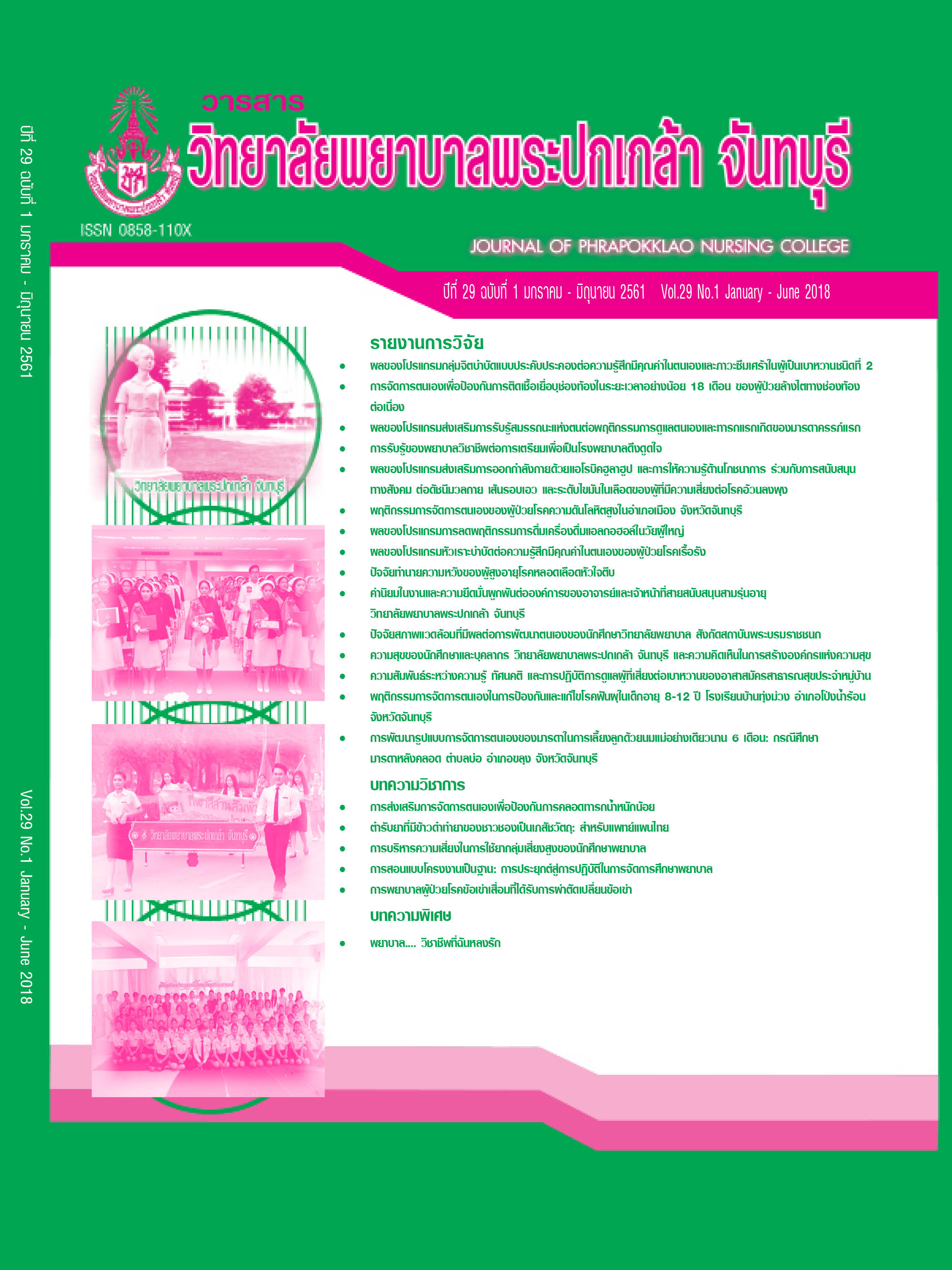Environmental Factors Affecting Self-Development among Nursing Students at College of Nursing under the Jurisdiction of Praboromarajchanok Institute
Keywords:
Environmental factors, Self-development, Nursing studentAbstract
This predictive correlational research aimed to study the correlation and predictive power between environmental factors and self-development among nursing students. The samples were 438 first to fourth years nursing students who studying at nursing colleges under Praboromarajchanok Institute during the first semester of the 2014 academic year. The research instruments were questionnaires included the demographic data, the opinion about the environment in nursing college (reliabilities were .86-.89), and self-development perception of nursing students (reliability was .85). The data collection were conducted from April to May, 2015. Data were analyzed by using frequency, percentage, mean, standard deviation, Pearson correlation, and stepwise multiple regression.
The research results revealed that the environment factors significant positive related to self-development of nursing students consisted of teaching method, classroom atmosphere, classroom discipline, student-lecturer relationship, activity participation, classmate relationship, and physical environment (p < .01). Factors affecting and predicting towards self-development were teaching method, classroom discipline, student-lecturer relationship, activity participation, and classmate relationship and they were able to make a prediction of 49.30%.
This research suggested that the lecturers should use cooperative learning method in sub-group or team learning in order to promote classmate relationship and student-lecturer relationship and arrange the extra-curriculum activities that enhance student-lecturer relationship.
References
กนกอร ศรีสมพันธุ์, บังอร ศิริสกุลไพศาล, และศุภาพิชญ์ โฟน โบร์แมนน์. (2560). การเรียนรู้แบบเพื่อนช่วยเพื่อนในกิจกรรมการสอบสาธิตย้อนกลับกลไกการคลอด. วารสารวิจัยทางวิทยาศาสตร์สุขภาพ, 11(2), 138-146.
กรกช อัตตวิริยะนุภาพ. (2540). ความสัมพันธ์ระหว่างการมีส่วนร่วมในกิจกรรมนิสิตนักศึกษากับการพัฒนาตนเองของนิสิตนักศึกษาในกรุงเทพมหานคร (วิทยานิพนธ์ปริญญามหาบัณฑิต). กรุงเทพฯ: จุฬาลงกรณ์มหาวิทยาลัย.
คณะกรรมการการอุดมศึกษา. (2552). แนวทางการปฏิบัติตามกรอบมาตรฐานคุณวุฒิระดับอุดมศึกษาแห่งชาติ พ.ศ. 2552. สืบค้น 10 มิถุนายน 2561, จาก http://www.mua.go.th/users/tqf-hed/news/FilesNews/FilesNews3/News328072552.pdf
จรินทิพย์ อุดมพันธุรัก, จงกลวรรณ มุสิกทอง, กอบกุล เลาหิตกุล, และวรบูรณ์ เหลืองรุ่งเรือง. (2553). ความสัมพันธ์ระหว่างพฤติกรรมการมีส่วนร่วมในกิจกรรมนักศึกษากับการพัฒนาตนเองของนักศึกษาพยาบาล. Journal of Nursing Science, 28(4 suppl.), 74-84.
ทรรศนีย์ วราห์คำ. (2554). การศึกษาการจัดสภาพแวดล้อมที่เอื้อต่อการเรียนรู้ของโรงเรียนวัดจันทร์ประดิษฐาราม สังกัดสำนักงานเขตภาษีเจริญ กรุงเทพมหานคร (วิทยานิพนธ์ปริญญามหาบัณฑิต). กรุงเทพฯ: มหาวิทยาลัยศรีนครินทรวิโรฒ.
ทัศนา ทองภักดี. (2551). ความสัมพันธ์ระหว่างประสบการณ์ในมหาวิทยาลัยกับบุคลิกภาพของนิสิตปริญญาตรี มหาวิทยาลัยศรีนครินทรวิโรฒ ประสานมิตร (รายงานผลการวิจัย). กรุงเทพฯ: สถาบันวิจัยพฤติกรรมศาสตร์ มหาวิทยาลัยศรีนครินทรวิโรฒ.
นงลักษณ์ วิรัชชัย. (2555). สถิติชวนใช้. กรุงเทพฯ: ไอคอนพริ้นติ้ง.
บุญใจ ศรีสถิตย์นรากูร. (2553). ระเบียบวิธีการวิจัยทางพยาบาลศาสตร์ (พิมพ์ครั้งที่ 5). กรุงเทพฯ: ยูแอนด์ไอ อินเตอร์ มีเดีย.
ประภัสสร ชโลธร. (2559). ความสัมพันธ์ระหว่างปฏิสัมพันธ์ของอาจารย์กับนักศึกษา และพฤติกรรมการเรียนของนักศึกษา ในระดับปริญญาตรี คณะครุศาสตร์ มหาวิทยาลัยราชภัฏนครราชสีมา. วารสารชุมชนวิจัย, 10(2), 7-16. สืบค้น 23 มิถุนายน 2561, จาก https://www.tci-thaijo.org/index.php/NRRU/article/view/93704/73362
ราชบัณฑิตยสถาน. (2556). พจนานุกรม ฉบับราชบัณฑิตยสถาน พ.ศ. 2554. กรุงเทพฯ: ศิริวัฒนาอินเตอร์พริ้นท์.
เรวดี นามทองดี. (2554). การคิดอย่างมีเหตุผลของนักเรียนช่วงชั้นที่ 4 โรงเรียนในสังกัดสำนักงานเขตพื้นที่การศึกษามัธยมศึกษาเขต 9 อำเภอเมืองนครปฐม จังหวัดนครปฐม (วิทยานิพนธ์ปริญญามหาบัณฑิต). นครปฐม: มหาวิทยาลัยศิลปากร.
วรรณี ชัยเฉลิมพงษ์. (2547). ปัจจัยที่ส่งผลต่อการเรียนรู้จากหลักสูตรแฝงอันมีผลต่อลักษณะทางวิชาชีพของนิสิตนักศึกษาเภสัชศาสตร์ (ปริญญานิพนธ์ปริญญาดุษฎีบัณฑิต). กรุงเทพฯ: จุฬาลงกรณ์มหาวิทยาลัย.
ศิริดา บุรชาต. (2556). ความสัมพันธ์ระหว่างปัจจัยเกี่ยวกับการเรียนการสอนและผลสัมฤทธิ์ทางการเรียน ของนักศึกษาสาขาการศึกษาปฐมวัย คณะศิลปศาสตร์และวิทยาศาสตร์ มหาวิทยาลัยนครพนม. วารสารมหาวิทยาลัยนครพนม, 3(3), 14-20. สืบค้น 1 มิถุนายน 2561, จาก https://www.tci-thaijo.org/index.php/npuj/article/download/44394/36729
สำนักส่งเสริมและพัฒนาศักยภาพนักศึกษา สำนักงานคณะกรรมการการอุดมศึกษา. (2551). กิจกรรมนักศึกษากับการพัฒนาคุณภาพบัณฑิต. สืบค้น 1 ธันวาคม 2559, จาก http://www.km.thaicyberu.go.th/linkfile/pmqa/File/KM51/scan/02/student.pdf
อรนิษฐ์ แสงทองสุข. (2555). การปรับพฤติกรรมการเรียนของนักศึกษาที่เรียนวิชา MGT311 (รายงานผลการวิจัย). กรุงเทพฯ: มหาวิทยาลัยศรีปทุม. สืบค้น 1 ธันวาคม 2559, จาก https://www.spu.ac.th/tlc/files/2015/06/Oranit-Saengthongsuk-2555.pdf
Aleandri, G., & Refrigeri, L. (2014). Lifelong education and training of teacher and development of human capital. Procedia - Social and Behavioral Sciences, 136(2014), 542-548. doi: 10.1016/j.sbspro.2014.05.372. Retrieved December 1, 2016, from https://ac.els-cdn.com/S1877042814038531/1-s2.0-S1877042814038531-main.pdf?_tid=3da25abb-9ae1-45a6-8db4-7e59c26918a2&acdnat=1527131060_74f9dba3b3d645bf9173390955f344dc
Astin, A. W. (1993). What matters in college?. San Francisco: Jossey-Bass.
Best, J. W., & Kahn, J. (2006). Research in education (10th ed.). Boston: Pearson Education Allyn & Bacon.
Chickering, A. W., & Reisser, L. (1993). Education and identity (2nd ed.). San Francisco: Jossey Bass Publishers.
Jacobson, J. F., Anderson, R. E., & Tatham, R. L. (1988). Evaluating instrument for use in clinical nursing research. In Frank-Stromborg, M. (Ed.). Instrument for clinical nursing research. pp. 1-19. Connecticut: Appleton and Lange.
Downloads
Published
How to Cite
Issue
Section
License
Copyright (c) 2018 Journal of Phrapokklao Nursing College

This work is licensed under a Creative Commons Attribution-NonCommercial-NoDerivatives 4.0 International License.
เนื้อความ ข้อมูล และรายการอ้างอิงที่ผู้เขียนใช้ในการเขียนบทความเพื่อลงตีพิมพ์ในวารสารวิทยาลัยพยาบาลพระปกเกล้า จันทบุรี ถือเป็นความคิดเห็นและความรับผิดชอบของผู้เขียน คณะผู้จัดทำวารสารไม่จำเป็นต้องเห็นพ้องด้วยหรือร่วมรับผิดชอบ
บทความที่ได้รับการลงตีพิมพ์ในวารสารวิทยาลัยพยาบาลพระปกเกล้า จันทบุรี ถือเป็นลิขสิทธิ์ของวารสารวิทยาลัยพยาบาลพระปกเกล้า จันทบุรี หากหน่วยงานหรือบุคคลใดต้องการนำส่วนหนึ่งหรือทั้งหมดของบทความไปเผยแพร่ต่อเพื่อวัตถุประสงค์ใด ๆ จะต้องได้รับอนุญาตจากบรรณาธิการวารสารก่อน



